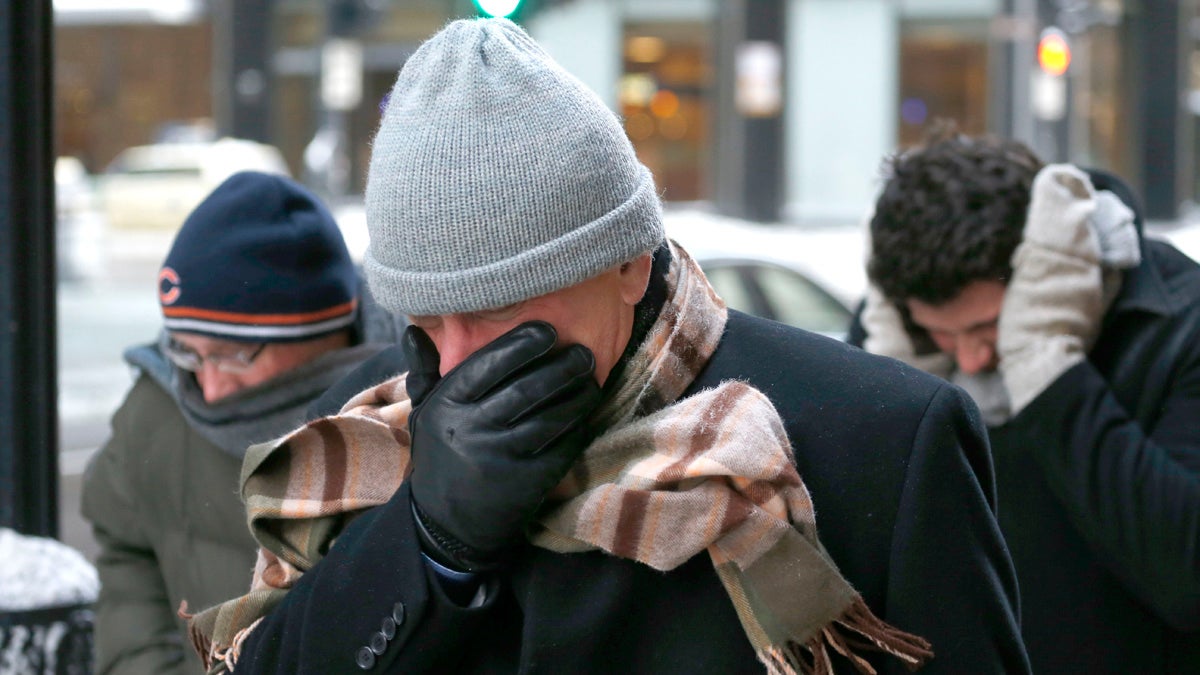5 ways extreme cold affects your body
Listen
Three men protect themselves from the elements as they walk in Chicago's Loop with temperatures well below zero. A whirlpool of frigid, dense air known as a "polar vortex" descended Monday into much of the U.S. (AP Photo/Charles Rex Arbogast)
With temperatures hovering near freezing this week, it’s a tough time to be outdoors. So, what exactly happens to one’s body when it gets bitterly cold, and what are the risks?
1. Your risk of frostbite increases
When the temperature drops, the body puts its energy into keeping the core — the chest, the heart and the abdomen — warm to prevent hypothermia, says Cooper Medical School emergency medicine chair Michael Chansky. “So with dramatic drops in temperature, you’re at very high risk of exposed extremities constricting blood vessels to conserve heat centrally,” he says.
George Blackwell, who spends hours a day outdoors for work experienced a scare this cold season. “My fingers were so cold. They ached,” he says. Dr. Chansky says that can be a sign of early frost bite. The most important thing: Don’t go from cold to partially warm, and then to cold again. “It’s better to stay cold and then partially rewarm — but don’t rub.” Otherwise, one could experience permanent tissue damage.
“If someone actually has frostbite, we don’t recommend anything other than coming to the hospital,” adds Dr. Robert McNamera, chief of emergency medicine at Temple University School of Medicine.
2. Your head is a major point of heat loss (so cover it up!)
Dr. Tejvir Khurana, a mountaineer and physiologist with the University of Pennsylvania’s Muscle Institute, says the head is “a huge heat-loss source,” but people often forget that. “A proper hat and head gear is extremely useful. The face, the tip of the nose, and ear tips are vulnerable in the cold,” he says. “So layer up and wear a scarf.”
3. Extreme cold can exacerbate asthma
Along with the very old and the very young, those with respiratory conditions, such as asthma, as well as those with circulatory conditions, such as diabetes or hypertension, are at greater risk for cold-related problems.
“The highest risk and cold-related injuries we see in the ER are respiratory conditions, patients with asthma and emphysema, or those who smoke,” says Cooper’s Dr. Chansky. “When they hit the cold air, they are at risk of constricting their airways and feeling short of breath, wheezing, they may present to the emergency department in respiratory distress.”
4. ‘Wet and wind’ heighten risk.
It doesn’t matter if you’re a mountaineer, climbing the highest, coldest peaks in the world, or not, says Dr. Khurana (who, yes, has done that). “You can get hypothermia in 50 degrees,” he cautions. “The wet and wind conditions are the two things to worry about along with the cold. If it’s cold, it’s one thing. But if it’s wet and windy, a body is going to cool a lot faster than you think, and that’s where you have to be careful.”
5. You might want to think twice about boozing it up
Dr. Chansky warns that alcohol makes the body more prone to exposure and heat loss. Along with its potential to impair behavior, alcohol dilates peripheral vessels and cause dehydration, leading to “less blood flow to vital organs when it’s cold.”
Stuck in the cold? These people can help.
When temps hit 20 degrees or below, the city authorizes a “code blue.” It means groups like Project HOME kick into full gear, connecting people who are homeless with daytime and nighttime emergency shelter options. Emergency hotline: 215-232-1984.
Laura Weinbaum, with Project HOME, hopes people who have taken refuge earlier aren’t deceived by the recent wave of warm weather. “People will have emerged from where they were and thought, ‘Oh, great. It’s 60 degrees. I can manage this,’ and are then really walloped by the cold. So we want to be extra, extra vigilant to make sure that doesn’t happen to people.”
WHYY is your source for fact-based, in-depth journalism and information. As a nonprofit organization, we rely on financial support from readers like you. Please give today.




